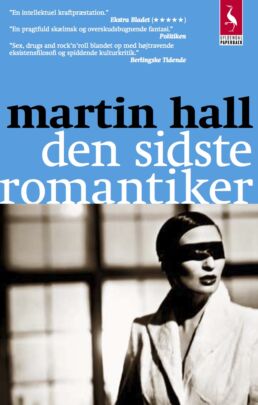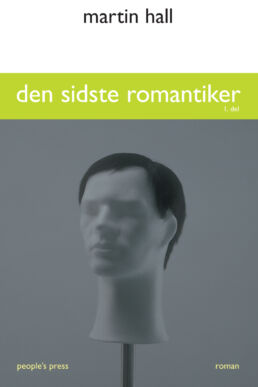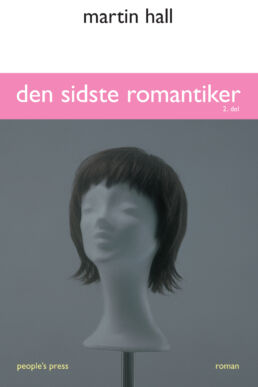THE LAST ROMANTIC
MARTIN HALL
TWO-VOLUME NOVEL
JUNE 2006
GYLDENDAL (ISBN 87-02-04955-4)
At the end of June 2006 Gyldendal, the biggest Danish publishing house, released Martin Hall’s epic two-volume novel The Last Romantic in its first paperback edition. Originally People’s Press had released the hardback novel in August 2005.
Gyldendal’s paperback version of the book became The Danish Booksellers Association’s ”book of the month” throughout July and August 2006 thereby securing the title its status as a regular bestseller. As a hardback novel the book had already sold several editions.
The Last Romantic has been translated into German and Lithuanian. It remains Martin Hall’s most read book and continues to cause controversy due to its roman à clef status.
The paperback version presented the book with a new cover design based on a photograph taken by Robin Skjoldborg. You can read more about the original version of the book here:
Genre: Novel
Pages: 705
Design: Kenneth Schultz
Photo: Robin Skjoldborg
“It was the summer of 1980. I was 18 years old, 1,82 tall and about 73 kg heavy. When Ronald Reagan was elected President of the United States in November, I was down to about 65. Some might say it was due to all the amphetamine I took, but it was just as much an attitude thing."
”One of the best descriptions of Danish cultural life (or lack of the same) in the last 25 years.”
( * * * * * )
Citadel (the Danish equivalent to i-D)
”A magnificent roguish and excessively rich fantasy … Gripping and amusing, intelligent and, I dare say: edifying.”
Politiken (the Danish equivalent to The Guardian)
”An intellectual feat of strength.”
( * * * * * )
Ekstra Bladet (the Danish equivalent to The Sun)
”Sex, drugs and rock’n’roll mixed with high-flown existential philosophy and a skewering critical angle to modern culture.”
Berlingske Tidende (the Danish equivalent to The Times)
”The best book I’ve read about ”the sons of no generation” as Hall calls them.”
( * * * * * )
Nordjyske Stiftstidende
”Seldomly gripping portrait of the eighties and nineties.”
( * * * * )
Femina
The following passage is taken from the publishers’ foreword to the original edition of the book:
“Throughout human and art history, the romantic struggle is a continuous motif. In the words of Sartre, this is nostalgia for the future – the desire to live life to its fullest, knowing that this will never be realized, and a state of melancholy for the same reason. In Martin Hall’s monumental novel, a gigantic epoch that stretches over 25 years from 1980 to 2005, the storyteller is a young author who matures in the course of the story: From the decadent punk and underground art scenes of the 80’s through the glittering excesses of the 90’s to the level-headedness of the mature man, the question remains; how do you keep your romantic ideals when the world around you doesn’t respond?
The Last Romantic is an extravagant tale about the children of the 80’s, the “sons of no generation” as the author himself has described the iconolaters of this age in a song. It is a novel about zeitgeist and daring, about speed freaks and dandies, dealers, rock’n’roll animals and S/M-parties, all written from the perspective of the particular temper of the times – a complete novel about white nights, the search for spirituality, casual sex, delirious love affairs, crass comedy and philosophy, all gathered in the experiences of a generation, who so far hasn’t had their literary testament written.
More than anything, The Last Romantic is the great novel about becoming a man – at all times.“
”One of the best descriptions of Danish cultural life (or lack of the same) in the last 25 years.”
( * * * * * )
Citadel (the Danish equivalent to i-D)”A magnificent roguish and excessively rich fantasy … Gripping and amusing, intelligent and, I dare say: edifying.”
Politiken (the Danish equivalent to The Guardian)”An intellectual feat of strength.”
( * * * * * )
Ekstra Bladet (the Danish equivalent to The Sun)”Sex, drugs and rock’n’roll mixed with high-flown existential philosophy and a skewering critical angle to modern culture.”
Berlingske Tidende (the Danish equivalent to The Times)”The best book I’ve read about ”the sons of no generation” as Hall calls them.”
( * * * * * )
Nordjyske Stiftstidende”Seldomly gripping portrait of the eighties and nineties.”
( * * * * )
Femina



